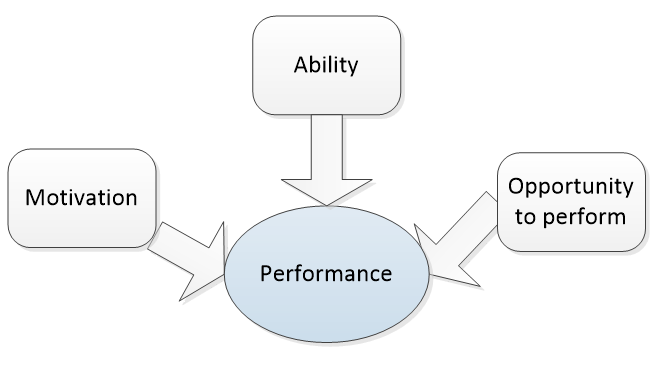Summary: IF Performance = Ability x Motivation x Opportunity to perform THEN let intrinsic motivation do its job. With words: if you want a good harvest you need great seeds, but you also need a good soil. You can increase the yield by going for the best possible seeds (scarce and expensive) or by providing a good soil for the seeds. The same applies to people. The extra efficiency we are looking for is in front of us, we just have to unleash it.

ROE (Return on Equity) is investor speak for more bang for the buck. It translates to “Do more with less” in management speak and it is increase of CPU speed, bandwidth etc. in engineer speak.
In case of humans performance is a function of Ability, Motivation and the Opportunity to perform. P = f(M x A x O). I take ability for granted in this post and will focus on the other two factors, the soil.
“A sower went out to sow. And as he sowed, some seeds fell along the path, and the birds came and devoured them. Other seeds fell on rocky ground, where they did not have much soil, and immediately they sprang up, since they had no depth of soil, but when the sun rose they were scorched. And since they had no root, they withered away. Other seeds fell among thorns, and the thorns grew up and choked them. Other seeds fell on good soil and produced grain, some a hundredfold, some sixty, some thirty.” /Matthew 13:8/ We have proof from a canonical source that the soil matters, so let us have a look at the “Motivation” and the “Opportunity to perform” parts.
Motivation

Traditional management uses two means to increase motivation: the carrot and the stick.
- About the carrot: According to the Herzberg two factor theory salary (beyond a certain point) is not a motivator but a hygiene factor.
- About the stick: Even a strong threat (losing the job) could not trigger a lasting response, the increased performance soon drops and turns into apathy. For details see the stress theory from Janos Selye.
Extrinsic and intrinsic motivation
Do you know who Samuel Pierpont Langley was? I did not know either until I came across a TED Talk titled “Start with the why”. (Check it out!) The point Sinek makes is that the extrinsic motivation of Langley (that is getting rich and famous) could not prevail against the intrinsic motivation of the Wright brothers (changing the World by creating the manned flying machine).
Okay, we need intrinsic motivation. The Self Determination Theory is centered on the belief that human beings show persistent effort and commitment in their lives that the theory calls "inherent growth tendencies." People also have essential psychological needs that are the basis for self-motivation to function. These innate needs are Competence, Relatedness and Autonomy.
- Competence - Seek to control the outcome and experience mastery..
- Relatedness - Is the hunger to interact, be connected to, and experience caring for others.
- Autonomy - Is the universal urge to be causal agents of one's own life.
Dan Pink uses a similar argument in his book titled Drive. He makes a point that long lasting motivation is built upon 3 elements.
- Mastery – the desire to get better and better at something that matters
- Purpose – the desire to do what we do in the service of something larger than ourselves
- Autonomy – the urge to direct our own lives
I do not cover mastery in this post; I think our recruitment engine is a painstakingly sufficient filter to let in only those with great skills. (For the record: these skills in the IT sector have a very short half-life, so regular training – with a fancy name lifelong learning - is a must.)
Let us have a look at the diagram again, but this time with a few suggestions:

Purpose – Insist on understanding the bigger picture! If you know how the cogwheel you are working on will be used, you will do a better job. Even more important: know the goals of your manager. There is nothing bad in asking for the goal sheet of your boss.
Autonomy - if the total fully loaded cost of the executives involved in a decision making is greater than the value of the topic being discussed then it looks like a candidate for delegation. Trust your own employees, expecting more is a self-fulfilling prophecy. So is the lack of it.
Clarity of goals - I came across folks in the organization who went on without an agreed set of goals for the better half of the year. How can one make a judgement call on the performance of these guys? Folks, insist on SMART goals at the beginning of the year! To illustrate it let’s pick an example from JFK:
- Specific - land a man on the Moon and return him safely to Earth
- Measurable - we would know if a man had landed on the moon (leave me alone with the related conteos)and could certainly tell if he returned safely to earth
- Action-oriented - JFK called for innovation and for a bunch of money for the NASA.
- Realistic - “I believe we have all the resources and talent necessary.”
- Time constrained - accomplish this goal by the end of the decade
Regular feedback - Managers with passion for technology: imagine a control system without a feedback loop. This would mean no error signal, ie. no chance for correction in case of any divergence from the target. Folks: insist on regular, meaningful feedback on your progress vs. your goals! Logistics: if you hear the other party (your boss) typing during the call you can bet (s)he is not writing the meeting minutes for you. If (s)he does not respond in time that means (s)he was on mute and was doing something else. Go for a video call whenever it is possible.
Time – although none of the theories mention it I bring it up: we are literally killing ourselves with meetings. The good news is that we are not the first victims; the book called Death by meeting was a must read 10 years ago at the CEEHQ of MSFTJ. After reading it you will insist on having a predefined agenda with an expected outcome, a last meeting follow up and someone assigned to take notes. This is okay to ask the question at the beginning what the objective of this meeting is and at the end if we reached this objective. BTW: Reciprocity is at work here, the bigger the number of participants is, the less likely to reach any decision. And yes, you do need a bio break between meetings. Really…
Pebble in the shoe - “It isn't the mountains ahead to climb that wear you out; it's the pebble in your shoe.” /Muhammad Ali/. Some units are very creative at defining rules that, when put into practice create deadlocks with other rules and make you crawl. Attention: Pointing out that other party’s brain is like an 8 bit CPU running at 800 kHz (vs. your 8 core i7 running at 3.5 GHz) will not help, they are also humans. The first rule is to understand where they are coming from. For example the more I learn about the potential ways of being hacked the more paranoid I become, ie. I hardly ever argue about security restrictions. (For the record, we are not the only paranoids: 20 years ago the CIO of the National Savings Bank told me that the best firewall was a 4 cm air gap. He meant it; Nat Savings went with two computers for every employee who was allowed to access the internet at all.)
On a positive note I encountered cases where treating the other party with respect and applying some negotiation basics did yield results. And yes, on a dark night I (almost) plugged my iPhone charger into the corp. power net.
The final word
“Do you know what people want more than anything? They want to be missed. They want to be missed when they're gone.” /Seth Godin/ Help them reaching their goal and you will get what you are after: higher performance at a lower cost.





